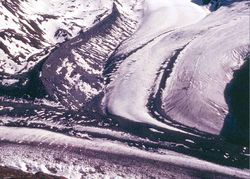Glaciology
2007 Schools Wikipedia Selection. Related subjects: Climate and the Weather
Glaciology is the study of glaciers, or more generally the study of ice and natural phenomena that involve ice. The word glacier is derived from the Latin glaciees, meaning ice or frost.
Glaciology is an interdisciplinary earth science that integrates geophysics, geology, physical geography, geomorphology, climatology, meteorology, hydrology, biology, and ecology. The impact of glaciers on humans adds the fields of human geography and anthropology. The presence of ice on Mars and Europa brings in an extraterrestrial component to the field.
Overview
Areas of study within glaciology include glacial history and the reconstruction of past glaciation patterns, effects of glaciers on climate and vice versa, the dynamics of ice movement, the contributions of glaciers to erosion and geomorphology, and lifeforms that live in the ice. Glaciology is one of the key areas of polar research.
Types
There are two general categories of glaciation which glaciologists distinguish: alpine glaciation, accumulations or "rivers of ice" confined to valleys; and continental glaciation, unrestricted accumulations which once covered much of the northern continents.
- Alpine - ice flows down the valleys of mountainous areas and forms a tongue of ice moving towards the plains below. Alpine glaciers tend to make the topography more rugged.
- Continental - an ice sheet found today, only in high latitudes (Greenland/Antarctica), thousands of square kilometers wide and thousands of meters thick. These tend to smooth out the landscape.
Zones of glaciers
- Accumulation, where the formation of ice is faster than its removal.
- Wastage, where the sum of melting and evaporation (sublimation) is greater than the amount of snow added each year.
Movement
- Ablation
- wastage through evaporation and melting
- Arête
- an acute ridge of rock where two cirques abut.
- Bergshrund
- crevasse formed near the head of a glacier, where the mass of ice has rotated, sheared and torn itself apart in the manner of a geological fault.
- Cirque, corrie or cwm
- bowl shaped depression excavated by the source of a glacier.
- Creep
- adjustment to stress at a molecular level.
- Flow
- movement (of ice) in a constant direction.
- Fracture
- brittle failure (breaking of ice) under the stress raised when movement is too rapid to be accommodated by creep. It happens for example, as the central part of a glacier movinges faster than the edges.
- Horn
- spire of rock formed by the headward erosion of a ring of cirques around a single mountain. It is an extreme case of an arête.
- Plucking/Quarrying
- where the adhesion of the ice to the rock is stronger than the cohesion of the rock, part of the rock leaves with the flowing ice.
- Tarn
- a lake formed in the bottom of a cirque when its glacier has melted.
- Tunnel valley
- The tunnel is that formed by hydraulic erosion of ice and rock below an ice sheet margin. The tunnel valley is what remains of it in the underlying rock when the ice sheet has melted.
Glacial deposits
Stratified
- Outwash sand/gravel
- from front of glaciers, found on a plain
- Kettles
- block of stagnant ice leaves a depression or pit
- Eskers
- steep sided ridges of gravel/sand, possibly caused by streams running under stagnant ice
- Kames
- stratified drift builds up low steep hills
- Varves
- alternating thin sedimentary beds (coarse and fine) of a proglacial lake. Summer conditions deposit more and coarser material and those of the winter, less and finer.
Unstratified
- Till-unsorted
- (glacial flour to boulders) deposited by receding/advancing glaciers, forming moraines, and drumlins
- Moraines
- (Terminal) material deposited at the end; (Ground) material deposited as glacier melts; (lateral) material deposited along the sides.
- Drumlins
- smooth elongated hills composed of till.
- Ribbed moraines
- large subglacial elongated hills transverse to former ice flow.
